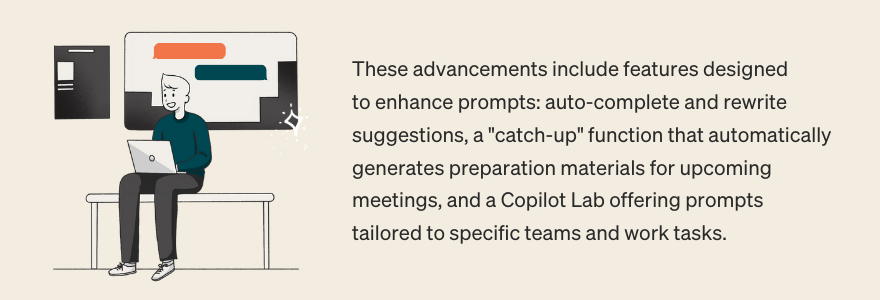The landscape of work is undergoing a significant transformation with the arrival of generative AI. Microsoft’s fourth annual Work Trend Index, its first collaborative effort with LinkedIn, sheds light on how AI is reshaping the way we work, lead, and hire on a global scale. This comprehensive report, titled “AI at work is here. Now comes the hard part,” draws on a vast amount of data, including a survey of 31,000 knowledge workers and leaders across 31 countries, along with information from LinkedIn jobs and labour data, trillions of Microsoft 365 productivity signals, and research conducted with Fortune 500 customers. Here’s insight from our MSP in Melbourne.
The Work Trend Index unveils three key themes that paint a vivid picture of the current state of AI in the workplace:
1. The Employee Embrace of AI: Frontrunners or Frustrated?
The report highlights a surging adoption rate of AI by employees, with a global average of 75% of knowledge workers leveraging generative AI tools at work. This enthusiasm stems from the tangible benefits employees experience, including time saved, boosted creativity, and the ability to prioritise crucial tasks. However, this rapid uptake presents a challenge for leaders.

In Australia, the number of professionals actively using AI has jumped significantly – from 36% to 53% in just one year, and our cousins in New Zealand boasts a particularly high adoption rate (84%) for AI technologies. Yet a significant portion of New Zealand leaders (74%) express concern about their organisation’s lack of a strategic plan for AI implementation. Similarly, just 27% of Australian office workers feel they are highly skilled in using generative AI for tasks, and 81% are seriously concerned about lack of relevant training. This highlights a potential disconnect between employee enthusiasm and leadership preparedness. Furthermore, 81% of AI users in New Zealand are taking matters into their own hands by bringing their preferred AI tools to work. This trend underscores the need for leaders to capitalise on this momentum by formulating a cohesive AI strategy that translates employee adoption into a strong return on investment.
2. AI Skills: The New Currency in the Job Market
While concerns linger about AI leading to job losses, the Work Trend Index reveals a different reality. The data suggests that employees equipped with AI skills hold a distinct advantage in the job market. Australia serves as a case study, with LinkedIn research indicating that a staggering 87% of hiring managers plan to expand or maintain their workforce this year. However, New Zealand faces a different scenario, with unemployment projections reaching at least 5% by the end of 2024. This situation emphasises the importance of upskilling for New Zealand workers. The report reveals that globally, only 39% of LinkedIn users have received AI training from their employers. This gap is being bridged by individual initiatives, with a surge in LinkedIn members adding AI skills to their profiles (142% increase) and a significant rise in non-technical professionals utilising LinkedIn Learning courses to build their AI proficiency (160% increase).

3. The Rise of the AI Power User: Redefining the Future of Work
The Work Trend Index research identifies four distinct user categories when it comes to AI: sceptics (rare users), informers (occasional users), adopters (regular users), and power users (extensive users). Power users, compared to sceptics, exhibit a fundamentally transformed approach to their workday. They actively reimagine business processes and leverage AI to save over 30 minutes per day.
The report also reveals a trend in New Zealand, where approximately 80% of power users integrate AI into their daily routines, aligning with the global average of 85%. Notably, over 90% of power users credit AI for making their workload more manageable and enhancing their work experience. However, the data uncovers a gap in leadership engagement compared to other countries. New Zealand power users are less likely to have heard from their leadership about the importance of AI utilisation. This could potentially hinder New Zealand’s ability to maximise the return on investment in AI technologies.
The report also highlights the need for fostering a culture of experimentation and training within workplaces. Only a third of power users in New Zealand actively experiment with different AI applications (compared to 68% globally), and a mere quarter frequently consult colleagues on effective prompts. Additionally, both Australia and New Zealand lags behind in offering role-specific AI training for power users.
Copilot for Microsoft 365: A Helping Hand with Prompts
Many Microsoft customers have expressed challenges in formulating effective AI prompts. To address this concern, Microsoft has unveiled innovations in Copilot for Microsoft 365 that empower users to get the most out of this generative AI technology. These advancements include features designed to enhance prompts: auto-complete and rewrite suggestions, a “catch-up” function that automatically generates preparation materials for upcoming meetings, and a Copilot Lab offering prompts tailored to specific teams and work tasks.
The Future of Work: A Collaborative Dance with AI
The 2024 Work Trend Index paints a clear picture: AI is no longer a futuristic vision; it is a tangible reality transforming the workplace. While challenges exist, particularly regarding leadership strategy and upskilling initiatives, the report also reveals immense opportunities. By embracing AI and fostering a culture of experimentation and collaboration, organisations can empower their workforces and unlock a new era of productivity and innovation.
The data from Australia and New Zealand offers valuable insights – the high employee adoption rate signifies a workforce receptive to AI, while the leadership gap highlights the need for a strategic approach to maximise its potential. As AI continues to evolve, the ability to adapt, learn, and collaborate with these intelligent tools will be paramount for success in the ever-changing landscape of work.
Otto IT – Your Small Business IT Services Solution
Our ISO27001 certified MSP in Melbourne is the ideal partner for small businesses entering the age of AI. We offer expert IT services for small businesses in all industries and sectors, including assistance in integrating cutting-edge technologies like Microsoft Copilot, robust cybersecurity, comprehensive IT support, top-notch training, and a range of cloud services. We can supplement your IT department, or you can outsource your entire IT department to us!
Contact us today for a FREE strategy call. Let’s chat!




